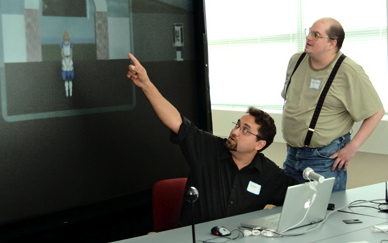Croquet workshop demonstrates revolutionary computer software
Distant computers share 3-D environment — creating a common lab

Croquet anyone?
Croquet is an open source project that has received major backing Apple, Disney, and HP that offers “a combination of open source computer software and network architecture that supports deep collaboration and resource sharing” among large numbers of users. The project, say its sponsors, will take computing experiences forward with one giant leap. And this will be accomplished, they say, without the mediation of central servers.
On August 23, 35 researchers participated in a Croquet workshop with 20 off-site colleagues — linked by the Internet — at the High Performance Computing Lab in the Photonics Center, providing a number of working examples of applications and environments.
“The workshop was a great success,” says Ed Boyce, a project leader for BU’s Center for Computational Science. “It was the first time the group developing this platform had successfully collaborated in cyberspace from settings across the country.”
At present, BU is using Croquet as a platform to build an education-related project: under the Engaging People in CyberInfrastructure (EPIC) program, Boyce is developing an application that will help schoolchildren understand the concept of scale. EPIC is funded by the National Science Foundation and is coled by Roscoe Giles, an ENG professor and deputy director of the Center for Computational Science.
Croquet’s software, which can process huge amounts of data and produce lifelike three-dimensional models and images, shows great promise for education and research applications, says Boyce, who coordinates EPIC’s Visualize Education Virtual Institute.
For researchers and educators, Croquet can break down barriers to collaboration. Because the software is flexible enough to present information in a manner that accommodates the computer on which it’s being viewed, it produces images that can be displayed and manipulated on high-tech visualization walls as well as on personal computers and allows users at remote locations to interact with the same models and with one another.
Operating in conjunction with computational models that simulate the dynamics and consequences of the laws of physics, chemistry, or other sciences, Boyce says that Croquet “will, for example, bring a shared lab experience to students at different colleges and universities.”
Croquet “provides a flexible framework to combine objects and computational models driven by multiple computers into a single shared 3-D environment,” he says.
Among the team of Croquet architects, led by HP Labs senior fellow Alan Kay, a pioneer of personal computing who won the 2003 Turing Award (computer science’s top accolade), present at the workshop were Julian Lombardi of the University of Wisconsin at Madison, Mark McCahill of the University of Minnesota, David Reed of the MIT Media Lab, David Smith of 3Dsolve, and Andreas Raab of the Viewpoints Research Institute.